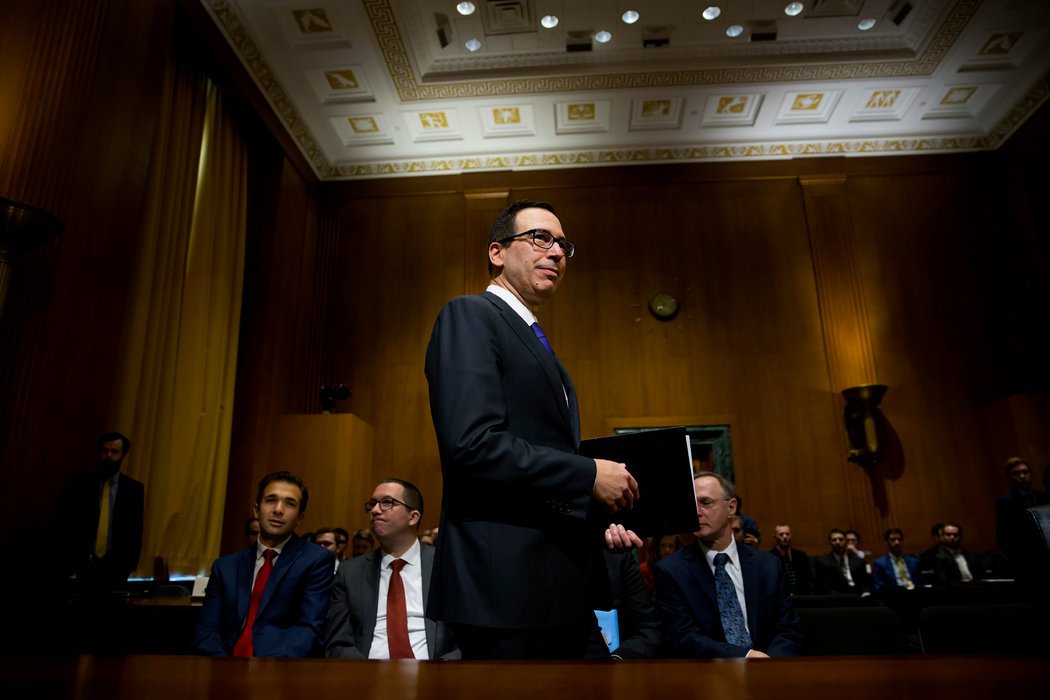Media Report

- The New York Times reports: "With trade tensions mounting between the United States and China, President Trump said he would dispatch his Treasury secretary, Steven Mnuchin, and other top economic advisers to Beijing next week to try to forestall an all-out trade war. On Tuesday, Mr. Trump said he was optimistic that the United States could reach a deal with China. But he warned that if the Asian nation did not live up to its promises to open its markets, his administration would proceed with the tariffs he has threatened to impose on as much as $150 billion worth of Chinese products... Mr. Trump said that the United States delegation was making the trip at China's request and that he was heartened by recent remarks by its president, Xi Jinping, suggesting that he was prepared to open his country's economy to more foreign investment and ease restrictions on imports of American cars."
- Bloomberg reports: "China wants foreign investment in its plan to become a world-class player in semiconductors, a surprise move at a time the U.S. opposes the Asian nation's goal of dominating next-generation technologies. As part of efforts to reduce an overwhelming reliance on foreign technology, the Chinese government set up a fund that aims to raise up to 200 billion yuan ($31.7 billion) to back a spectrum of domestic firms from processor designers to equipment makers. The China Integrated Circuit Industry Investment Fund Co. will now take foreign money, the country's tech industry overseer said Wednesday. "The second phase of the national IC fund is still raising money. We welcome overseas companies to participate in the fund," Chen Yin, general engineer and spokesman of the Ministry of Industry and Information Technology, told reporters in Beijing."
- CNBC reports: "President Trump recently called out China for claiming the special privileges of a poor country, tweeting that "China, which is a great economic power, is considered a Developing Nation within the World Trade Organization. They therefore get tremendous perks and advantages, especially over the U.S. Does anybody think this is fair[?]" With a number of U.S.-China trade disputes simmering, this criticism from Trump seemed designed to justify his various tariff threats, on steel, aluminum and a wide range of other products. Like many of Trump's policy pronouncements, this one was clumsily framed and misleading, but had a grain of truth to it."
Calendar
- 2018-04-24 Worrying signs China is moving backward on reforms, warns U.S. official
- 2018-04-23 How China Is Buying Its Way Into Europe
- 2018-04-22 China's ZTE says it's seeking a solution to US tech ban
- 2018-04-20 In a Trade War, China Might Boycott U.S. Goods. That Could Backfire.
- 2018-04-19 China says it's ready to deal with any fallout from trade row with US
- 2018-04-18 U.S. Moves to Block Sales by Chinese Telecom Equipment Makers
- 2018-04-17 In new sign of trade battle, China slaps U.S. sorghum producers with 179 percent deposit
- 2018-04-16 The world is scrambling now that China is refusing to be a trash dumping ground
- 2018-04-15 China's Economy Poised to Brush Off Trump Threats, Debt Campaign
- 2018-04-13 China’s Trade Surplus With U.S. Soars
News
- The New York Times Steven Mnuchin Will Head to China as Trade Tensions Mount
- Bloomberg China Invites Foreign Cash to Build a World-Class Chip Industry
- CNN Trump says Mnuchin will visit China for trade talks 'in a few days'
- CNBC China's first homegrown aircraft carrier is a sign of the country's military aspirations
- The New York Times Students Defiant as Chinese University Warns #MeToo Activist
- The Wall Street Journal American Express Advances in Effort to Access China Market
- CNBC Africa needs to know what it wants from China, expert says. Here are two key issues
- The New York Times Wanted at Chinese Start-Ups: Attractive Women to Ease Coders' Stress
- Newsweek Russia and China Militaries Reach 'New Heights' Together, Agree to Challenge U.S. in Middle East
- CNBC Aston Martin CEO: 'We've seen this explosion of growth in China'
- Bloomberg For China's Buddhist Monks, an IPO Too Far
- CNBC Police in Chinese city seize 600 computers used to mine bitcoin
- CNBC Tesla can help China's electric car market grow bigger and stronger, says start-up WM Motors
Commentary
- Bloomberg China Spurring Another Horse-to-Cars Moment
- ChinaFile Sold People
- Bloomberg Dealing With China's High-Tech Ambitions
- CNBC What Trump gets right about China and trade
- CoinDesk China's Official Government Auditor Is Looking at Blockchain Solutions
- National Review China's Crossbow Culture
